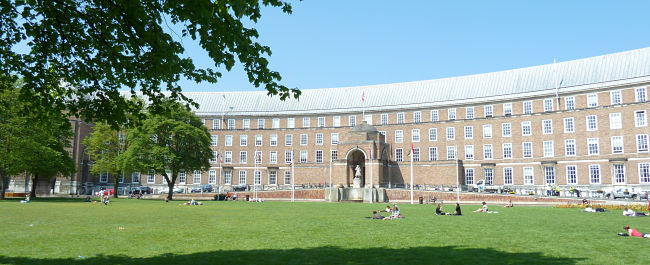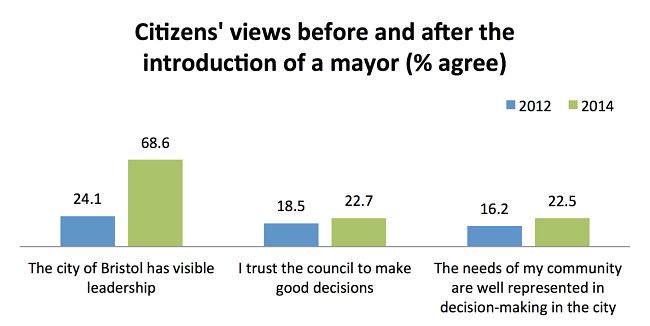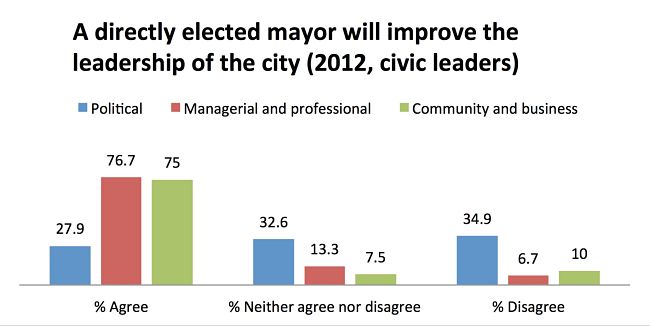A directly elected mayor can enhance visible city leadership

Based on Bristol’s experience with a directly elected mayor, this research evaluates the move to mayoral governance.
The idea of strengthening city leadership in the UK by introducing directly elected mayors has featured in public policy debates for the last 25 years or more. Supporters claim that they will provide more visible, more accountable, and ultimately more effective city leadership. Yet, despite continued support from high profile public figures such as Tony Blair, David Cameron, and Michael Heseltine, few English cities have adopted this form of urban governance.
The Localism Act 2011 required the largest cities in England outside London to hold referendums on whether or not to adopt a directly elected mayor.
In the ten referendums that were subsequently held in May 2012, Bristol was the only city to vote yes. At the following mayoral election, held in November 2012, Bristol voters again chose a distinctive path by electing an independent candidate, George Ferguson, to lead the city.
The Bristol Civic Leadership Project (BCLP) offers a positive contribution to debates about how to ensure that the mayoral model works well for the city from its initial introduction to how it evolves over time.
There has been a significant increase in citizens who believe the City has visible leadership, although public perceptions relating to trust and representation still remain troublingly low.
Background
- The mayoral model can provide high profile, visible leadership. This outward-facing civic leadership is well suited to the challenges now facing cities and city regions in the UK.
- The mayoral model appeals to stakeholders beyond the realms of city hall. A directly elected mayor may be able to facilitate collaboration in a way that was difficult for previous council leaders to achieve. This is because the process of direct election gives them enhanced legitimacy.
- The mayoral model gives a clear focus for representation. Bristol has seen a significant increase in engagement at national, European, and international levels since the move to mayoral governance.
- Although the mayoral model is not a universal fix for urban governance, it certainly opens up possibilities for urban innovation. Directly elected mayors can more forcefully claim that they are leaders of the place, not just leaders of the council.
- Consideration needs to be given to create ‘routes in’ for people’s voices to be heard, in order to enhance representation and trust in decision-making.
Key findings
- There are at least three types of civic leadership in any given city: political leadership; managerial and professional leadership from public sector organisations; and community and business leadership.
- There are strikingly different perceptions across these realms of leadership. In survey data collected in 2012, before the introduction of the directly elected mayor, those from the political realm were much more positive than others about existing governance arrangements. Similarly councillors tended to have a much more negative view about the mayoral model of governance.

- Public opinions were gathered early in 2014 about how the mayoral model is working in practice, and compared with views before the introduction of the mayor from the Autumn of 2012. Citizens were asked whether the city has visible leadership. Before the introduction of a directly elected mayor just under one-quarter of respondents answered yes; since the mayor has been in place just over two-thirds did so.

Further information
In May 2012 Bristol citizens voted for the directly elected mayor model of governance by a margin of around 5,100 votes, from a turnout of 24%.
The BCLP project is a collaborative action/research project between the University of Bristol, the University of the West of England, Bristol City Council and civic leaders drawn from the community and business sectors. It draws on surveys of the public, surveys of local stakeholders, and interviews and workshops with civic leaders from the public, private, and third sectors in the city. Data has been gathered before and after the introduction of the new system of governance. You can find out more via the website: bristolcivicleadership.net/
The first project report is available: Hambleton, R. Howard, J., Marsh, A., and Sweeting, D. (2013) The prospects for mayoral governance in Bristol. Bristol: UWE.
Policy Briefing 7: 2014
A directly elected mayor can enhance visible city leadership (PDF, 428kB)
Contact the researchers
Dr David Sweeting
Senior Lecturer in Urban Studies
Centre for Urban and Public Policy Research
david.sweeting@bristol.ac.uk
Professor Robin Hambleton
Centre for Sustainable Planning and Environments
University of the West of England
robin.hambleton@uwe.ac.uk
Authors
Dr. David Sweeting, University of Bristol
Professor Robin Hambleton, University of the West of England, Bristol